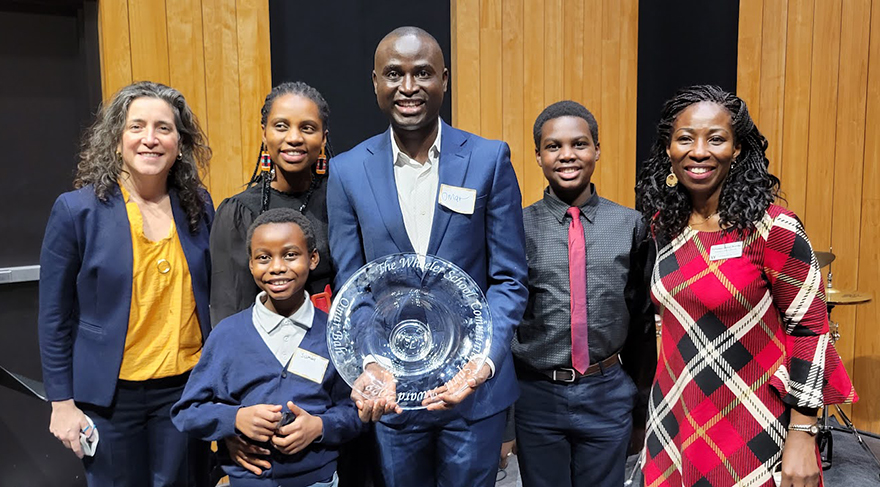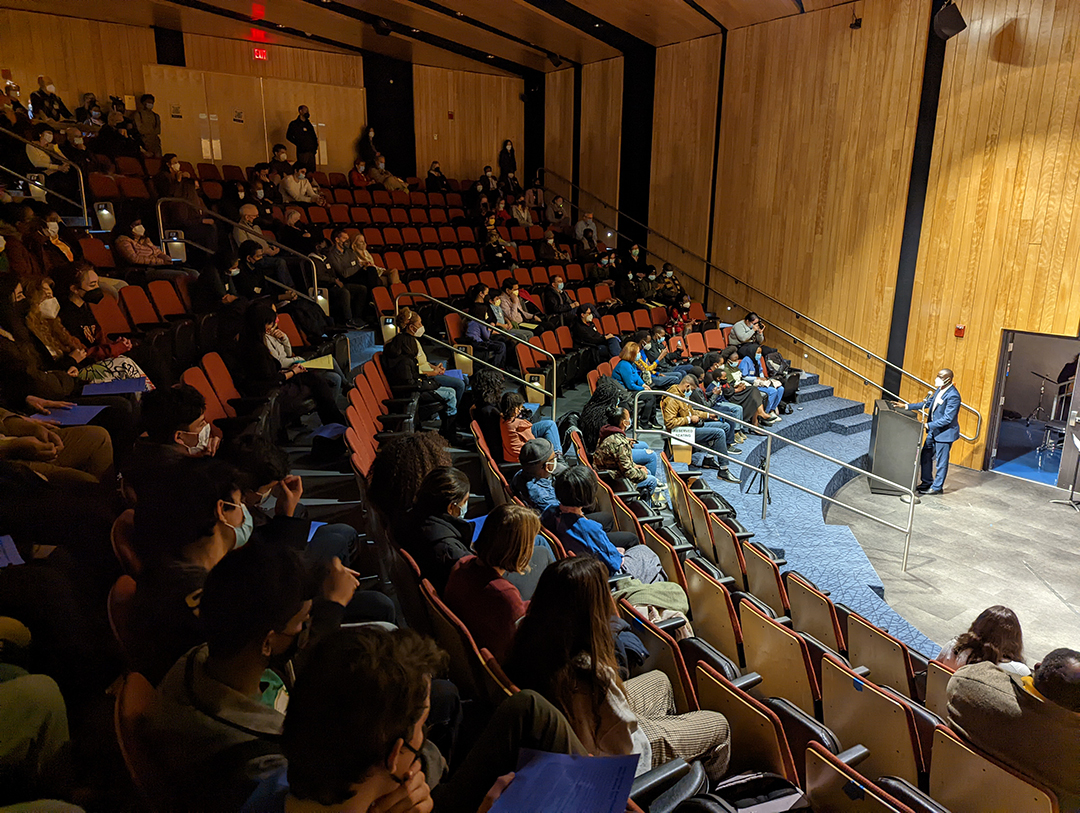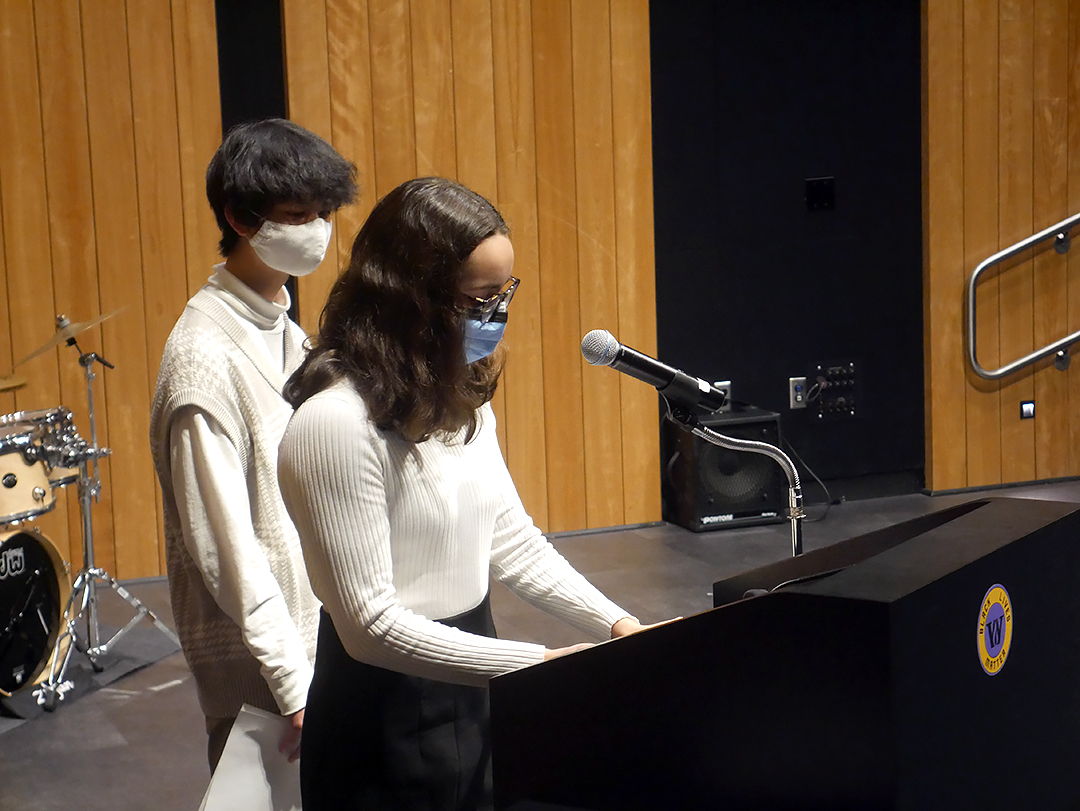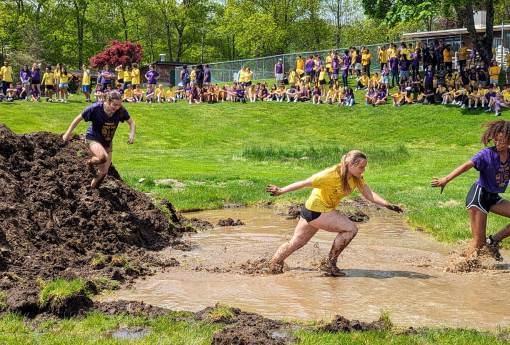
Presenting the 2022 Wheeler Community Spirit Award to Omar Bah
February 15, 2022

The Wheeler community gathered in Isenberg Auditorium last week to celebrate the life and achievements of Omar Bah, founder and executive Director of the Refugee Dream Center, Inc. (RDC),as the 2022 recipient of the Wheeler Community Spirit Award.
Co-heads of Students Involved in Cultural Awareness (SICA) Isabela Castano ’22 and Kendall Alves ‘24 introduced Bah, who was joined by close family members. He thanked Head of School Allison Gaines Pell, Director of Unity and Diversity Princess Bomba, those in attendance, his family, and all of his supporters throughout the refugee community. Attendees were also treated to the annual SICA Family Potluck in Madden Gym following the ceremony.
The Community Spirit award recognizes a person in the Providence community who advocates for those with fewer opportunities. They are selected based on their efforts in four key areas: passion for equity and social justice, both locally and globally; appreciation for and promotion of the benefits of education; commitment to creating opportunities in the community for those who otherwise might not have a voice or an advocate; and resilience in the face of challenge and adversity.
Bah is a torture survivor, former journalist, and refugee from The Gambia in West Africa. He is also the author of the book, Africa’s Hell on Earth: The Ordeal of an African Journalist. Bah founded the RDC, which is based in Providence, along with his wife, Teddi Jallow. Through the center, refugees learn new skills, receive case management support and job training, and network in a diverse setting as they work towards self-sufficiency in their new communities and integrate into American society by interacting and sharing their unique cultures and skills.
During the ceremony, Bah recounted his journey to resettlement in the U.S., and his first job at Rhode Island Housing 15 years ago. Prior to this, he had spent a year living in a refugee camp in Ghana after escaping from The Gambia.
“The funny part is I am from the smallest country in Africa, and they brought me to the smallest state,” he joked.

Though unfamiliar with Rhode Island and faced with starting from scratch in a new nation, he was undeterred. He recalled the small beginnings within a studio apartment in Providence, which included a couch, a space heater, and a donated computer, which he used to write about his experiences in Africa.
“Sometimes I’d see myself laughing just by myself like a crazy person and, at some point, I would just be crying, thinking about my story, thinking about my family, and thinking about my journey,” he said.
Bah channeled his experience and hardship into volunteer work, helping refugees navigate their new lives in the U.S and address the narrative and misconceptions about their needs. “There is literally no support for refugees after six months from their arrival,” he said. “I said, ‘Okay, why don’t we start a center and start the process where we will pick up after the six months and work with them for as long as they need.’”
To meet these needs, the Refugee Dream Center works with refugees to provide “companionship and support” at all levels, whether it’s resources for job training, interpretation, or connecting with social services, to ensure they become self-sufficient and integrated into their new communities. Bah’s foundation also focuses on mentoring youth through the Refugee Youth Dream, which empowers teens and young adults.
“If we made an effort to make a difference in the lives of thousands of people and build bridges between youth in the schools and American communities and refugee communities, we can make an even greater difference at the national level,” Bah said.
The event also featured essays read by two 8th-grade students, Philip Dang ‘26 and Julia Yakirevich ‘26. Both students recounted the experiences of their immigrant mothers, the adversity they faced, and how it influenced their upbringing.
Philip spoke about his mother’s challenges with leaving Vietnam to begin a new life in the U.S., close to relatives in Virginia. She was only 16 at the time and did not speak good English, and her first arrival came with worries and uncertainty.
“She had everything she could ever want in Vietnam and never thought about going to America. However, she knew America had great education,” Philip said about his mother. “She always wanted to learn English and become a doctor or a teacher. She knew that going to America would be best for her and her mom. My grandma needed a job to support my mom’s education and be close with her family. Most of her siblings and relatives lived in America.”

He shared his mother’s memories of introducing herself at her first day of school and some of the apprehension regarding her English skills. While Philip’s mother had felt embarrassed and it was a challenge to focus on what her professor was saying, the day wasn’t as bad as she anticipated.
“She laid in bed, feeling even more determined to communicate with people. No more being laughed at or pretending to understand. She wanted to feel confident and comfortable speaking in front of large crowds. Being a great writer is a great start to understanding English. It was hard to put into words, but a spark inside filled her with hope. She wanted to fit in.”
With help from tutors, teachers, and her own mother, Philip’s mother eventually found her stride with the English language. Those experiences of coming to America and rising to new challenges motivated his mother to learn new things and achieve her goals.
“The people who laughed at me the first day, I felt ashamed of myself,” Philip’s mother told him “But they actually helped me get the motivation to try even harder. My mom was always my role model. She had worked in many different jobs trying to raise me well and support my education. I am so grateful to have a mother like her and I wanted to help her out as she got older.”
Julia shared how her mother had been living in Hoiniki, Belarus in 1986 when a festival celebrating Belarusian Workers Day was interrupted by the Chernobyl disaster. Shortly after, her mother’s family relocated to Crimea where they were cared for by extended family members, and the group struggled with adjusting to the dangerous realities of nuclear radiation and misinformation from government officials.
“While meticulously cleaning herself in hopes to expel the radiation from her body, she recalls tasting remnants of leftovers of the sweet and scrumptious cake that was baked in celebration of her birthday. The once delightful and saccharine taste, now left a foul one in her mouth, a symbol of the havoc wreaked upon her life. What had once been a rare treat to celebrate my mother’s special day, quickly became a reminder of tragedy.”
However, Julia noted that her mother had been motivated by the tragedy to pursue a life of selflessness, which she passed on to her son and daughter. Her mother recalled learning about firefighters who had responded to the disaster suffering from acute leukemia and other illnesses linked to radiation exposure. While the experience was traumatizing, it allowed her to connect with others through her shared experience, and this empathy drove her to ultimately pursue a career in medicine.
“She pursued a career in oncology, specifically treating leukemia and lymphoma, helping many others whose struggles are similar to those of the first responders,” Julia said. “She became a person patients could trust and admire, one whose wisdom and empathy blazes through any set of walls. Through overcoming a myriad of adversities, she has been able to widen her senses of compassion, thoughtfulness, and selflessness, and gained valuable qualities that have shaped her into the physician, citizen, and mother she is today.”

